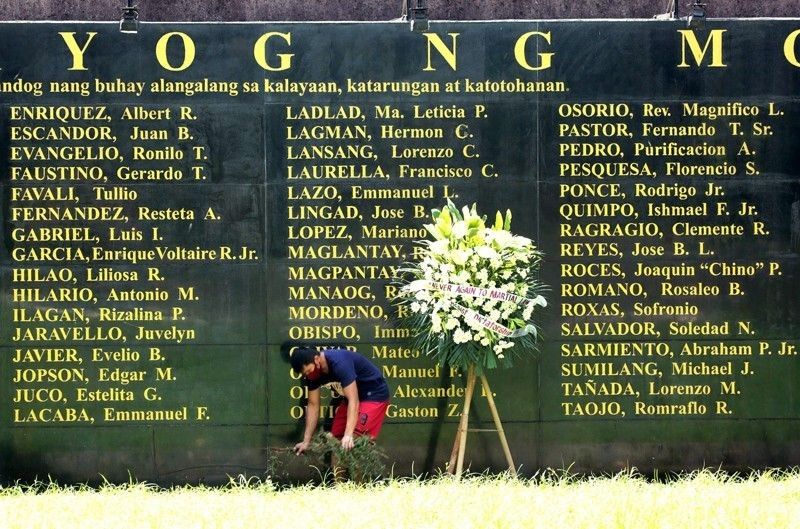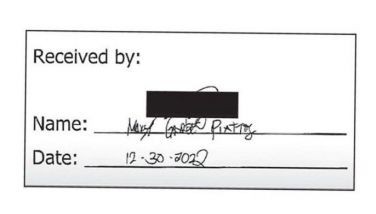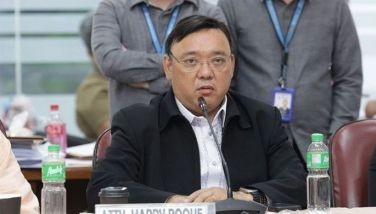Asked about Martial Law abuse, Marcos questions Amnesty International data

MANILA, Philippines (Updated 3:21 p.m.) — Instead of commenting on people reportedly killed, tortured and imprisoned during the Marcos dictatorship, presidential aspirant Ferdinand "Bongbong" Marcos Jr. cast doubt on Amnesty International, a rights group that sent missions to the Philippines during Martial Law.
Boy Abunda, in a one-on-one interview with Marcos that aired Tuesday, asked the presidential aspirant whether data from Amnesty International were just lies.
"According to Amnesty International during your father’s presidency, from 1972 to 1981, about 72,000 were imprisoned, 34,000 were tortured and 3,240 were killed. Tanong: Itong data ba na galing sa Amnesty International, Sen. Bongbong, ito ba ay pawang kasinungalingan lamang (Are these just lies)?"
Marcos said he had not seen the international watchdog’s data and that he has no idea how they came up with the statistics.
“Let us ask Amnesty International to share that information that they have and maybe it will help us make sure that the system works and what alleged abuses occurred should not occur again. I think that’s the only way that we can remedy that situation,” he said.
Amnesty International sent two missions to the Philippines: One in 1971, with the Marcos patriarch's approval. Another team was deployed in November 1981. Reports were published in 1976 and 1982, respectively.
In its second mission, the delegation received information on 49 cases that "involved serious allegations of violations of human rights" that include arbitrary killing, execution by government agents and torture.
In a statement, Amnesty International Philippines said that it will send Marcos copies of the reports on human rights violations during the elder Marcos' dictatorship.
"Anyone running for president who says they do not know how public information on human rights violations during martial law were generated is blatantly denying history," AI Philippines section director Butch Olano said.
"We urge him to acknowledge the atrocities committed under martial law as written in our reports, condemn the actions of his father’s regime, show remorse and publicly apologize to the victims, their families and the entire nation," he said.
"As a presidential candidate he must prove his willingness to bring about justice by making it clear in his platform how he plans to address impunity in the country. This is the bare minimum for him, the Filipino people deserves no less.”
By law, the Philippine government recognizes that human rights violations were committed under the elder Marcos.
READ: 31 Years of Amnesia: Era of Impunity
Human Rights Violations Victims’ Memorial Commission
One government "remedy" to victims of rights violations during the Marcos dictatorship was the creation of the Human Rights Victims’ Memorial Commission through the enactment of Republic Act 10368.
The law, signed by President Benigno Aquino III, is also known as “An Act Providing for Reparation and Recognition of Victims and Human Rights Violations During the Marcos Regime, Documentation of the Said Violations, Appropriating Funds Therefor and For Other Purposes.”
The commission, on its website, said the law hailed as an "unprecedented legislation in the Philippines and the Asia" with the State "acknowledging its legal and moral obligation for the gross human rights violation committed by the regime" of the elder Marcos.
The law created the Human Rights Victims’ Claims Board, which was tasked with receiving and evaluating applications for reparation claims.
Based on its website, the HRCVB processed the claims of 11,103 victims of human rights violations committed from 1972-1986.
Broken down, it has processed claims of the victims of the following abuses:
- Killing and enforced disappearance: 2,326
- Torture (rape and forcible abduction): 238
- Torture (mutilation, sexual abuse, involving children and minors): 217
- Torture (involving psychological, mental and emotional harm other than insanity, acts of lasciviousness): 1,467
- Cruel, inhumane and degrading treatment: 182
- Arbitrary detention (for more than six months): 699
- Arbitrary detention (lasting between 15 days to six months): 1,417
- Arbitrary detention (lasting between 36 hours to 15 days): 1,239
- Involuntary exile (involving violence and illegal takeover of business): 578
- Involuntary exile (involving intimidation and physical injuries): 2,739
RA 10368 also created the Human Rights Violations Victims’ Memorial Commission, which is mandated to “establish, restore, preserve and conserve Memorial, Museum, Library and Compendium in honor of many [human rights violations victims] during the Marcos regime.”
In a statement, Karapatan Secretary General Cristina Palabay said Marcos is only "feigning ignorance" on rights violations during his father’s bloody rule since he was "old enough" at he time to be aware of them.
She also pointed out that Marcos was a senator when RA 10368 was passed into law. The Amnesty International reports were also "heavily referenced and discussed" during deliberations on the bill, she added.
"The only way that justice can be delivered in part is to recognize that these violations were committed, that the perpetrators are held to account, that monetary and non-monetary reparations are provided to the victims, and that there would be non-repetition of such crimes and atrocities," Palabay also said.
"It is something that you and your family have continuously denied. Do not mock the victims further by feigning ignorance."
Marcos is campaigning as a "unifying" leader. He said that, if elected, he plans to win over victims of his father’s brutal regime who strongly oppose his candidacy with his sincerity and plans.
In an interview in October 2021, Marcos reiterated his stand that he "can only apologize for what I have done. That makes perfect sense. You cannot apologize for what somebody else has done."
- Latest
- Trending































